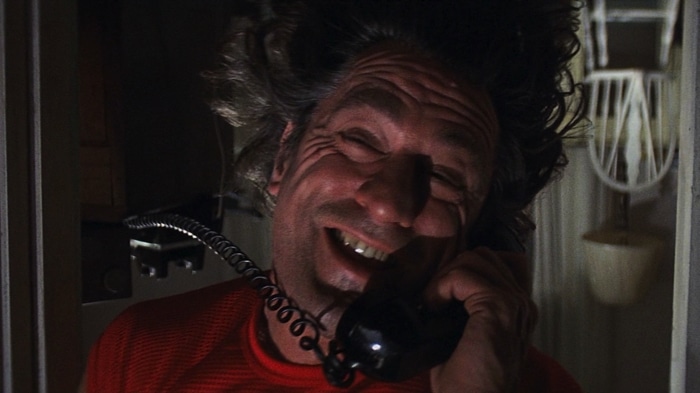
Dir: Martin Scorsese | Wri: Wesley Strick from the novel by Joh D MacDonald | Cast: Robert De Niro, Nick Nolte, Jessica Lange, Juliette Lewis,
J Lee Thompson’s cult classic 1961 thriller is undoubtedly a more sober and classy reflection on recidivism with its serious and starkly realised legal procedural, you cannot deny the appealing immediacy of Martin Scorsese’s version, its characters are certainly more relatable in our contemporary gaze. The 1991 Cape Fear has four colourful central performances to enjoy, as well as cameos from key characters from the original, including Robert Mitchum and Gregory Peck (in what would be his final film). As a piece of entertainment the 1991 version has everything, including Freddie Francis behind the camera, although some may argue its melodrama and schlocky sensationalism verges on the extreme. It’s a thriller and a fiery one at that, Scorsese finding a brilliant way of bringing things to a climax in the coruscating final act.
Scorsese’s decision to stage the final denouement during a tempestuous rainstorm on the bayou was a masterstroke, the turbulence of the rushing water serving as a magnificent metaphor for the emotional turmoil felt by all the characters, and for different reasons: Nolte’s defence lawyer is hellbent on protecting his family (Lange’s histrionic wife, the innocence of her daughter (Lewis). And a felon just keen to survive as the waves gradually claim the psychotic victim.
Scorsese leaves us in no doubt that his married couple are still enjoying each other, whereas the Peck and his staid onscreen wife Bergen seem to have veered off that avenue of pleasure, despite their relative youth. Robert De Niro makes for a terrifying villain as bible-bashing Max Cady; all quietly persuasive and self-righteous, he emerges a viciously twisted misogynist when riled, and a chilling sociopathic monster in a finale that will remain seared to the memory, alongside Javier Bardem’s Anton Chigurh in No Country for Old Men (2017). In preparation for the role De Niro paid a doctor USD 5,000 to grind his teeth down and then USD 20,000 to have them restored after shooting had finished. He also used vegetable dyes for the horrific tattoos, that faded a few moths later.
In contrast Robert Mitchum’s 1962 Cady is a standard nasty piece of work, but he doesn’t make our blood run cold, certainly not from a woman’s point of view, coming across moreover as a suave operator who just happens to be a sadistic small time criminal. But Mitchum comes up trumps in the Scorsese version as the heavyweight Lieutenant Elgart. In contrast J Lee Thomson’s womenfolk are twee coffee morning folk, particularly Polly Bergen’s prissy housewife, Peggy. Admittedly it was early Sixties Georgia in America’s staid Deep South (where race riots were still raging).
Martin Scorsese regular casting director Ellen Lewis makes a wise choice with Juliette Lewis for the role of Danielle Bowden, and both she and De Niro garnered Oscar nods for their performances. She gives a great deal of texture to the flirty vulnerable teenager: on the cusp of adulthood, and hormonally charged, she is sexually curious yet still possessing of a young girl’s fragile charm.
Nolte’s Bowden has clearly put a foot wrong in his legal judgement by suppressing evidence that may have kept De Niro’s Cady out of jail, and he continues to blot his copybook on this misdemeanour, flirting with Douglas’s unstable Lori Davis rather than making amends with a decent apology to Cody.
Casting and performance-wise Gregory Peck comes across as a morally superior Bowden, with his finally chiselled jawline, matinee idol demeanour and clean-suited integrity, as against Nolte’s rather scuzzy married man nursing a nascent midlife crisis and sniffing around before the inevitable onset of sexual disfunction. Bernard Herrmann’s thundering score also unites these two films (remastered for the 1991 version), it’s a magnificent and memorable musical calling card to what will follow. As an elegantly realised moral drama the award goes to J Lee Thompson, but as a rip-roaring riveting thriller Scorsese wins with Cape Fear. MT
CAPE FEAR IS NOW ON BLU-RAY | 14 DECEMBER 2020 | COURTESY OF FABULOUSFILMS.COM